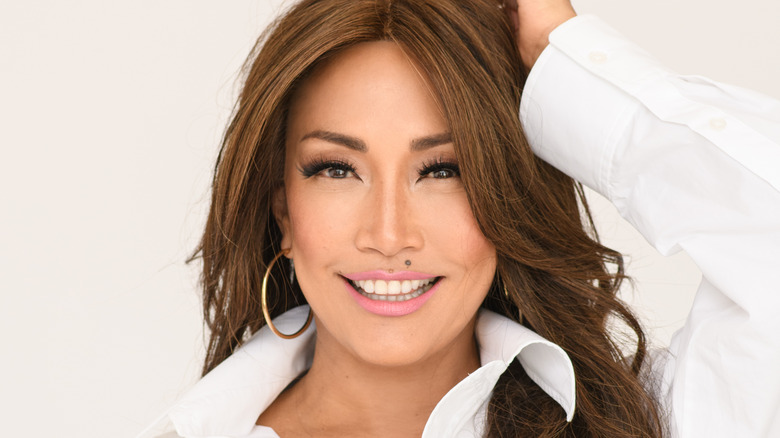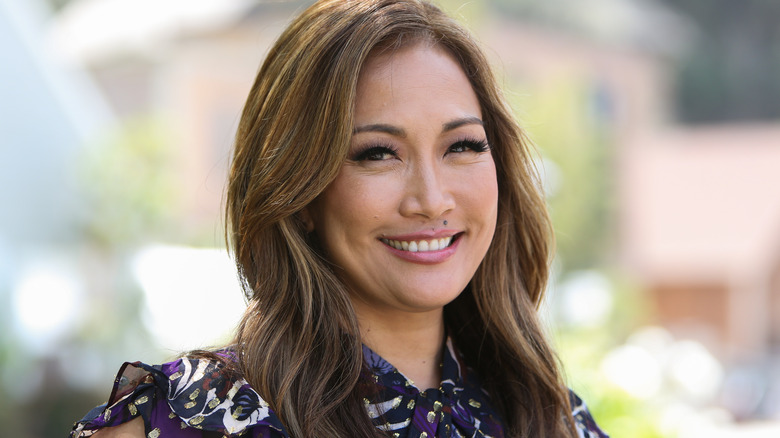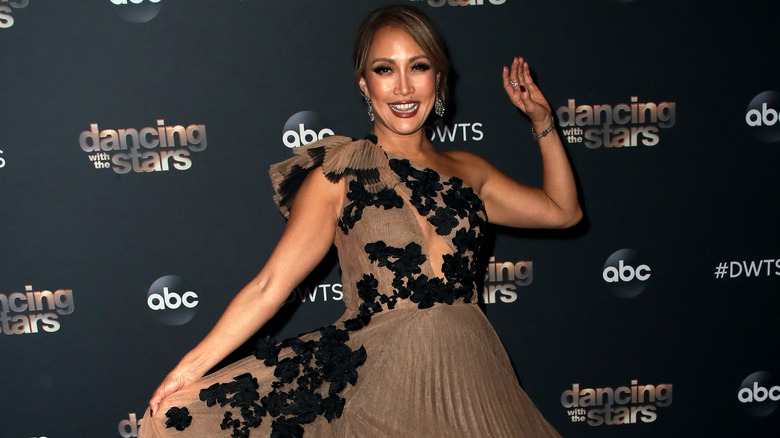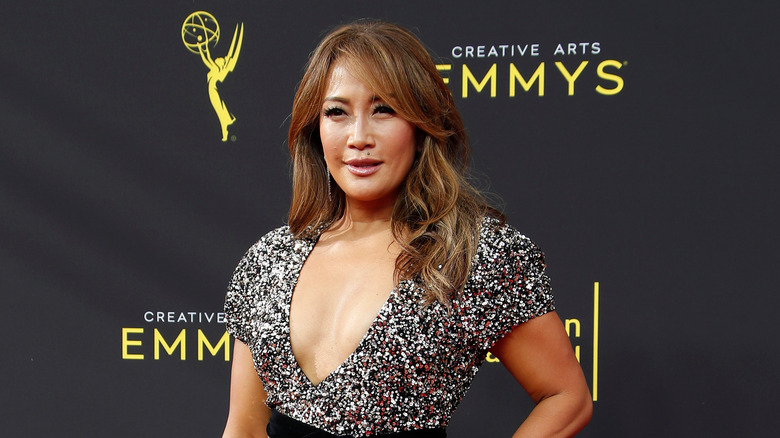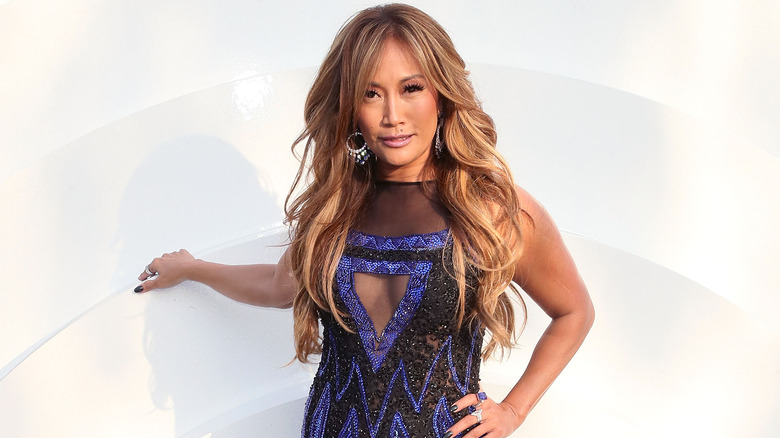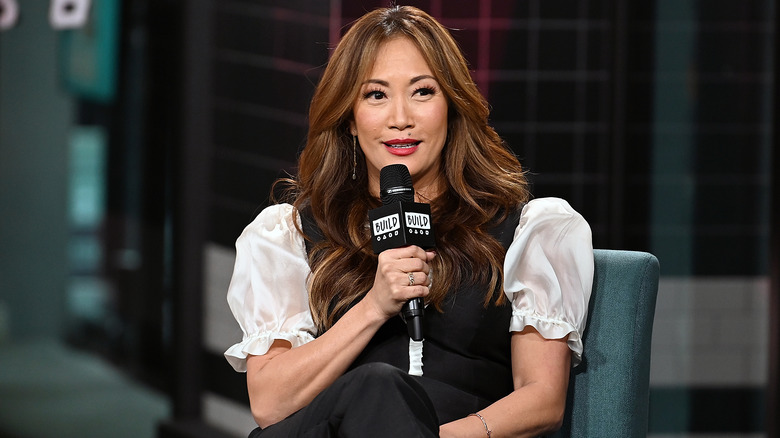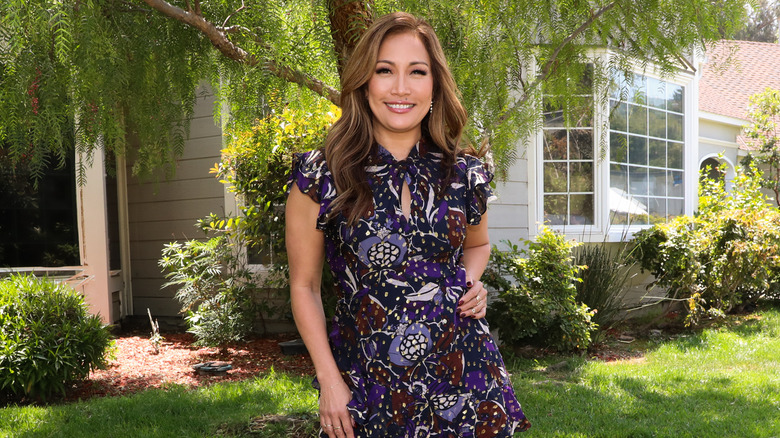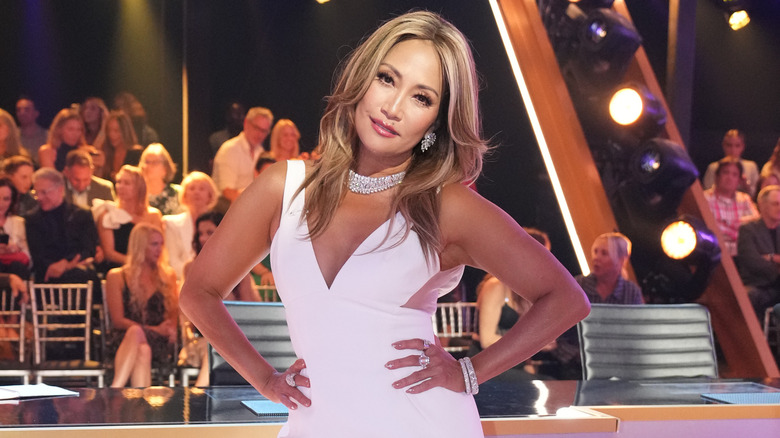Carrie Ann Inaba Opens Up About Living With Chronic Illnesses - Exclusive Interview
"Dancing with the Stars" judge Carrie Ann Inaba has been determining dancers' fates for nearly two decades on our television screens. Behind the scenes, however, she's been living with multiple chronic illnesses: lupus, fibromyalgia, rheumatoid arthritis, and Sjögren's Syndrome.
As a professional dancer, pain and inflammation (along with many other symptoms) following her every move hasn't been easy — but it also hasn't stopped her. Now, Inaba has set out to share her story in the hopes she can teach others with autoimmune diseases that they, too, still have the power to live out their best lives.
Since speaking with medical professionals, health coaches, and even mediums through her wellness platform, Carrie Ann Conversations, Inaba has learned the importance of support. That includes supporting herself and scheduling rest when she needs it. Taking time to listen to your body is of utmost importance more than ever in this bustling world — and we had the opportunity to spend some time with Inaba discussing what it's like balancing a busy work schedule while also managing multiple illnesses.
In an exclusive interview with Health Digest, Inaba opened up about how she takes charge of her chronic pain, the health tips she has for others who have been diagnosed with an autoimmune disease, and the "gifts" that she feels her multiple illnesses have given her.
On living with multiple autoimmune diseases
You've been diagnosed with multiple autoimmune diseases over the last few years, and you've gone through various treatments for them. How are you doing now? What does your life look like managing them today?
Well, first of all, I'm doing really well. It was interesting, because last week, I caught a little stomach flu. For people who have autoimmune disease, sometimes a tiny cold can set you out into a flare, and it becomes so much bigger.
All of the work that I've been doing for the past — well, for quite a while now, but intensely for the past year and a half, two years — has paid off, because this time it was just the flu. I could completely tell the difference. It didn't lead into a flare. It might sound silly, but it was actually very exciting for me because I could see that the work that I had been doing had paid off.
What I've been doing and how I manage my life with autoimmune disease is very carefully. One of the biggest gifts of having autoimmune conditions is that you become much more aware of how fragile your health can be. With autoimmune conditions, there's so little that they know about it that there's so much space to grow and learn and be your own best advocate.
A lot of it for me has to do with ... I love to research, so I'm always researching. I am a Capricorn, so I'm also very hard-headed about things, and you could say I'm stubborn. That's helped me, because when you have an autoimmune disease, you are met with a lot of doctors that don't often believe your symptoms and gaslighting.
You also deal with confusion yourself about the conditions, because you get one diagnosis from one doctor, and one diagnosis from another doctor. Then, some of your friends — even people that you know love you and support you — don't always get it. You have to be on top of it, and that's something that is really important and I always want people to know. You have to be in charge of your own life, and that means your health.
Prior to your first diagnosis, what was the defining moment for you that made you realize that something was wrong?
It was many. There's no one big moment that I thought, "Oh, something's wrong." There were many, many things.
First, it started out with ... I used to get dry eyes a lot, and Sjögren's Syndrome is an autoimmune condition where your immune system attacks your moisture-producing glands, so that includes your tears. Your ability to make tears is affected, and so are salivary glands and your skin moisture.
It started with my eyes. They were constantly dry. I kept asking the doctor, "Is there something wrong?" They're like, "No. No, no, no." I went to three to five doctors, and it wasn't until ... I actually had to go to a rheumatologist to be diagnosed. After running blood tests, they finally figured out that it was Sjögren's.
At that time, I was also diagnosed with Lupus — well, I was diagnosed, but they didn't tell me. That's nobody's fault. It's just that with autoimmune conditions, it's very difficult. It's very hard to get clear answers, and it's overwhelming, and there's so much information that gets thrown at you.
Here's how she heals her ongoing inflammation
What lifestyle changes did you make to your life after getting those diagnoses?
In the last two years, I reached a point where I was in immense pain, and the pain wouldn't stop. It's because my body was having so much inflammation, and you get also depressed when you're in this state and you're in a constant flare-up.
I made huge changes, and I started to research areas that I'd never researched before. I started to see a psychiatrist — Dr. Daniel Amen — and I learned that there is a component to some of the inflammation in my body that comes from emotional trauma. I wanted to deal with all the levels of inflammation, so we started to work on my mental health. He likes to call it "brain health," which is such a wonderful way of thinking about it. Once I started to understand that — if you can focus on your brain's health, everything else is going to fall in line and in order.
For people who are struggling with autoimmune conditions, one of the most difficult things that I hear often from people that follow me and talk to me about it and share their stories with me is that it's so confusing. First, you're trying to deal with one layer, and then there's another layer of it that evolves, and then you have to look at this doctor. It's very hard to figure out what to prioritize.
He gave me something very simple and very basic, and it helped me so much because I focused on brain health. I changed the way I ate, making sure that everything that I ate, my body liked and I reacted well. I kept a food diary in the beginning. He says, "Find 20 foods that you love and love you back." That's such a beautiful way of putting it, and [it was] changing the way I was looking at the way I was eating as opposed to trying to think "anti-inflammatory," which felt so stringent and rigid to me.
This felt like love. "I love this food, and it loves me back. I don't get a flare-up. I don't have pain from it. I don't get congested from it. I don't have a breakout from it. This works." That was step one.
Step two, I started doing hyperbaric oxygen chambers. That helped a lot because that brings down inflammation in the body as well.
I also started to read, and I reached out to a lot of people. I started Carrie Ann Conversations, and I started talking to a lot of people who are experts in the area of health and wellness. One of them is Anthony William, the Medical Medium. He taught me about how celery juice was so helpful and about Epstein–Barr Syndrome and how that works in the body.
Those two directions became my sole focus. All I did was make sure that I was eating foods that loved me — that I loved and loved me back — [and] that I was doing my hyperbaric oxygen chambers.
How movement helped her inflammation
Carrie Ann Inaba (continued): I was also making sure that every day, no matter how much pain I was in, that I did some sort of physical movement. That's difficult. That sounds so simple for most people, but when you're having an active flare-up, and your body won't respond to you the way you want it to, it's almost impossible. Then the longer you go without exercising, the worse it gets. That's the same for everybody, right? [laughs] When we don't exercise, it gets worse and worse and harder to get back up. But when you're in a pain cycle, or you're in a flare-up, it feels almost impossible.
I started to work with a physical therapist, and he helped me understand that if you can just do five minutes, that's fine. Coming from a dancer's background, that felt like, "No, that can't do anything. I come from dancing my whole life. I'm a full-blown athlete. This five minutes? No, I may as well not."
He was like, "No, we're going to do five minutes. We're going to go fast and hard for 15 seconds, and then slow and easy for 45 seconds for five rounds." That was it. That also started to take the pain levels down and started to make the endorphins. It started to help me have endorphins in my body, and it started to feel good, so it all works together. There's no one simple solution.
Her tips for others with autoimmune diseases
What tips do you have for someone who has an autoimmune disease and wants to continue doing what they love — like dancing — while also being able to successfully manage the pain and other symptoms of their disease?
There are so many things. There are so many tips, because we need a lot of tips. We need a big old jar of tips, as I like to say.
Number one is [to] get yourself a wall calendar. I know that sounds silly, but if you have big events coming up, you need to allow yourself proper rest. I schedule my days that are busy, and I also schedule my days to rest, so that I can make sure that my body gets the recuperation, because we do need a little bit more time to restore our bodies back to normal. That's one thing.
Make sure you're eating well [and] keeping movement a part of your daily regimen, no matter how difficult it is — even if it means at night before you go to bed, doing shoulder stretches and arm circles. The simplest things to keep your body moving is so important.
Also, it's important to journal and take care of your mental health. Journaling is a huge tool that I use in my life, because sometimes we hold things in, whether it's emotions or thoughts, and by journaling them, you let them out. A lot of people believe that some of the pain that we hold in our body is based in trauma and that we hold those painful memories or those fearful thoughts, and when we release them onto the page, our body no longer has to store them. That helps to reduce levels of inflammation. For me, it does. Obviously, [for] each one of us on our autoimmune journeys, we're all very different.
It's also important to make sure that you listen to yourself. It's a good idea to approach any modality of healing. I use reiki. I use acupuncture. I use energy work. I use lasers. I try anything, because if it works, then it works. It's relief.
You can't give up. It's not even just about being your own advocate, but it's about continuing to try. That gives you something to focus on, because sometimes you can get down on yourself when you have these conditions, and this helps you be proactive and involved in your own health and your own future.
Why it's been important to share her health journey with the world
I read on Carrie Ann Conversations that some people initially encouraged you to keep quiet about your autoimmune diseases. What made you want to publicly share your experiences?
That was a hard decision for me, because as a judge, people can judge us pretty harshly back. A friend of mine did tell me that, with my best interests at heart. But I realized that I can't be 100% truthful out there if I'm not truthful about this, so I wanted to share where I come from and what's going on with me.
Health and wellness is ... How do you say it? When you have a compromised immune system, or an overactive immune system, or any situation with your health, we've been programmed to think that's a negative or a disability. What I've learned through living it every day is that there are so many beautiful things that come from it. I wanted to share all of that. If I wasn't going to share the fact that I had these conditions, then I would never be able to share the gifts that also came along with it.
You've talked to so many different people on Carrie Ann Conversations. What's been the most memorable story or piece of advice that you've learned?
There are so many. I'm so fortunate. People give such great tidbits of advice, and you have to go through it.
But my interview with the Medical Medium, Anthony William, was one of my favorites and touched me deeply, because he's somebody who had a very special gift. He's a medium, and that's not accepted by everybody, and not everybody believes it. Yet he still, every day, does his best to try to share whatever knowledge he has to help people with their health. I know how much it has helped me, and his advice has been mind-blowingly productive on my journey towards health. His interview was so touching, and he's so sweet, and he's filled with knowledge.
[A] close second would be Dr. Daniel Amen, who ... He's so loving and has such practical advice, because I tend to be very emotional and I tend to overthink things, and he keeps things very basic and simple, which has also been really helpful for me.
He said something to me once that is helpful for everybody: Question your own thoughts. As somebody who came up in the dance world, I always believed in believing every thought I had, because I thought that was what creativity was. However, some of your thoughts can be self-defeating, and those are not the ones that you want to be believing. He helped me to discern what to put my heart and soul into, what thoughts to believe with my full heart and soul, and which thoughts are, "Let me put a pause on that. Let's see if it passes, and then see what to do with it." That's been very helpful.
Having chronic illnesses has given her many 'gifts'
Throughout your health journey, it seems like you've always had such a positive mindset. How do you feel like you arrived at that point? What helped you develop such a positive perspective overall on disease in general?
My mom had breast cancer, and she's a survivor. I helped her go through that journey as her caretaker, and then my father developed cancer. He sadly passed away, not from cancer, but from a heart attack many years later.
I'm so sorry.
Thank you. I appreciate that. But in those journeys and being there to witness what they were going through — and this was before I was diagnosed with my chronic illness — I knew that we all needed cheerleaders. I could see how much my mom and my dad were struggling and how much they needed someone to be their cheerleader, to lift them up, to help them research, to help them understand, and to be their support system.
When I got sick, I knew what I needed to be for myself. That positive mindset all stems from knowing that it's challenging to go through life with chronic illness. If you focus on that, you're going to stay in the challenge of all of it, as opposed to if you focus on the gifts, you're actually going to experience more gifts. It's the law of abundance and the law of attraction.
Her excitement for a new season of Dancing with the Stars
A new season of "Dancing with the Stars" is in full swing on Disney+. Is there anything that you're most looking forward to seeing this year?
Oh, my gosh. This season's so much fun. These two-hour shows with no commercial breaks on Disney+ are so intense, so much fun, and it never ends.
Last [week], I loved Elvis Night. It was so much fun. We've never done an Elvis Night before like that, so that was exciting. We have so many new things happening this season. We have Bond Night happening [this] week, which is very exciting. That's never been done.
I like watching how the show's evolving. Every week, it feels old, like how it used to be — meaning the good old days — but it also feels young and fresh and new all at the same time.
I also think Disney+ Night is going to be super cool, because in the past, we've done Disney Night where we celebrate most of the Disney films, but now, we get to be inspired by all of the properties of Disney+, which means Marvel and Star Wars as well. That's going to be an amazing night ... I've been looking through all the pictures trying to figure out, "What character do I want to be inspired by that night?" [laughs]
Are there any competitors this season that you have your eyes on?
I was thinking about this last [week] after the show, how special this season is. Selma Blair stands out immediately to me because of her journey with MS [multiple sclerosis], and how I personally relate to that journey and how inspired not only I am, but how I think everyone is inspired by what she's doing.
As I think about Selma, then immediately I'm thinking of Daniel [Durant]. He's blowing my mind and teaching all of us how to "listen" — and I put listen in quotes — to music and to dance to music in a completely different way than I have ever experienced it.
I look at a lot of these contestants this year as people that I am learning from in many ways, and I am enjoying that process ... I'm also enjoying watching Trevor [Donovan], who has no dance background and admitted a fear of dancing. I didn't know there was such a thing, but from what I understand, it's very real. He's come a long way.
We also have Shangela, who is a firecracker. She reminds me of my dancer roots. She feels so familiar to me ... In the dance world, we have a lot of people who do drag, so it's very commonplace. She doesn't stand out in that way to me because it's so normal. In fact, all performers are doing drag to a certain extent. But she is so much fun, and I'm watching her and Gleb [Savchenko], and it's such a fantastic pairing. Oh, my gosh, and now, I'm thinking about Vinny [Guadagnino] and Koko [Iwasaki].
They're all really good. It's a fun group, and what I like is they're super different. Each one, each pairing, is so different than the next that it's really fun.
For more on Carrie Ann Inaba's health and wellness journey, visit her website Carrie Ann Conversations.
This interview has been edited for clarity.

